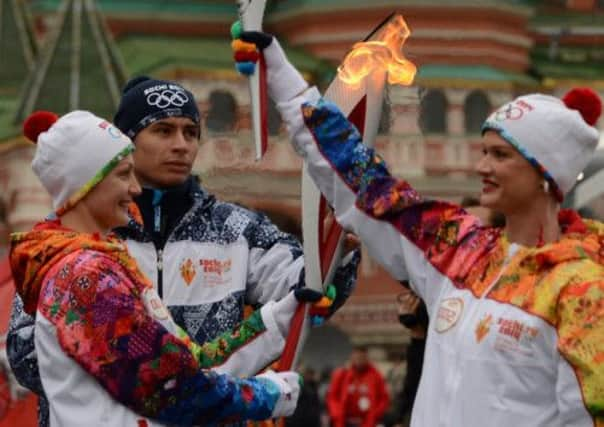Olympic torch begins long journey across Russia


In the words of president Vladimir Putin, the four-month Olympic flame relay will “show the world Russia as she is and as we love her.”
The longest torch relay before a Winter Olympics seems designed to celebrate a spirit of exploration and conquest as well as Russia’s variety and most of all its sheer scale, taking the flame though all 83 regions spanning ten time zones.
Advertisement
Hide AdAdvertisement
Hide AdIt will go to the North Pole on an atomic-powered icebreaker, to Europe’s highest peak, Mt Elbrus, to the depths of Siberia’s Lake Baikal and to the International Space Station, whose crew will take the torch – unlit – on a spacewalk.
More than 14,000 torch bearers also will take part in the relay at the more than 130 stops along the way.
More than 90 per cent of Russia’s people will be within an hour of the flame – a way to encourage them to feel involved.
After leaving Moscow, the relay will make a wide, sweeping circle around the capital through some of Russia’s most historical cities before heading north toward St Petersburg. It will then travel from the far western exclave of Kaliningrad to the easternmost point just across the Bering Strait from Alaska, before swinging back through the vast country to Sochi in time for the opening deep-winter ceremony on 7 February.
“Today is a joyous and momentous day,” Mr Putin said at the launch.
“The Olympic flame – the symbol of the planet’s main sports event, the symbol of peace and friendship – has arrived in Russia, and in a few minutes it will be on its way around our huge country.”
The choreographed celebration did not all go according to script, however.
There was a nationally televised moment of embarrassment early in the torch relay on Sunday, when the flame went out as a portly former swim champion carried it through a Kremlin gate.
Advertisement
Hide AdAdvertisement
Hide AdHe looked around for help and a guard standing by the pathway came to the rescue with a cigarette lighter.
But six years after he secured the 2014 Games for Sochi with an impassioned pitch, it is Mr Putin – who turned 61 on Monday – who is the most invested in making the only Olympics staged in an independent Russia a success.
Mr Putin has faced international criticism over a law he signed this year prohibiting the spread of gay “propaganda” among minors, which activists and Western governments say is discriminatory and curtails basic human freedoms.
Critics have also questioned the $50 billion (£31bn) cost and the wisdom of holding the Winter Games in a subtropical locale, and have called a security decree Mr Putin signed “draconian” because it restricts movement and bans rallies unrelated to the Olympics.